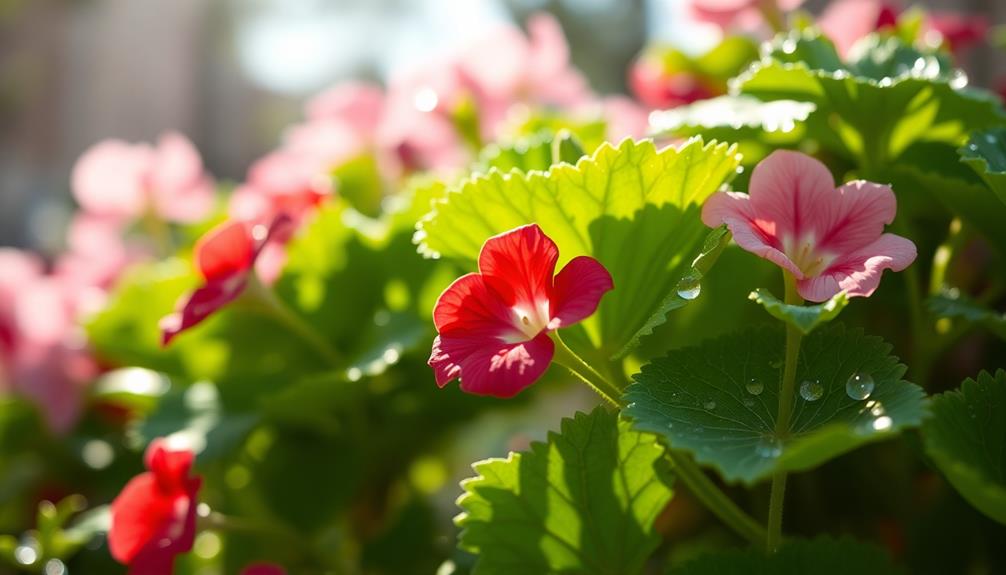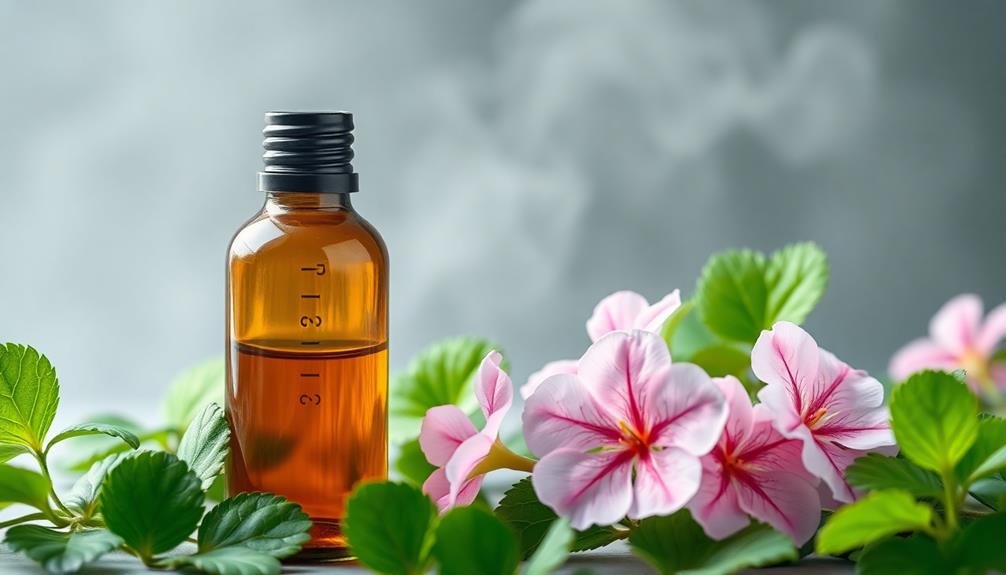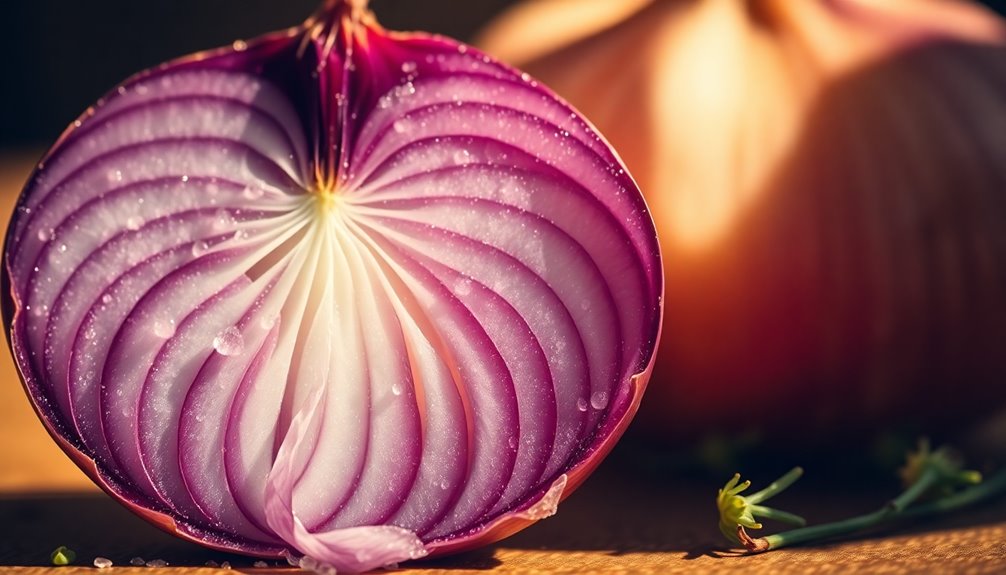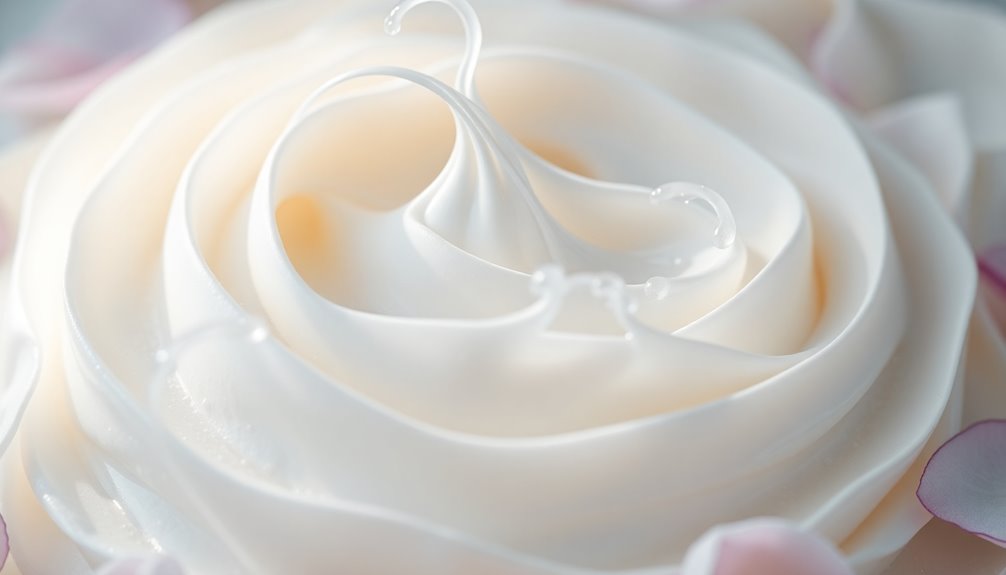Geranium oil has a unique and delightful scent that combines refreshing floral and herbaceous notes. Imagine a bright aroma that's less sweet than rose oil but just as uplifting! You'll notice hints of lemon and mint, making it feel fresh and clean. This oil, derived from the leaves of the Pelargonium graveolens plant, creates a lovely atmosphere whether it's in your personal care products or during a relaxing spa day. Known for its calming properties, it's both versatile and charming. Stick around to discover even more about how this enchanting scent can brighten your day!
Key Takeaways
- Geranium oil has a distinctive floral aroma, combining floral and herbaceous elements for a refreshing scent.
- Its unique profile includes refreshing hints of lemony and minty characteristics, alongside possible peppery notes.
- The aroma strikes a balance between floral and fresh, making it ideal for personal care products.
- Often referred to as "poor man's rose," it offers a more affordable yet captivating fragrance compared to rose oil.
- The scent enhances emotional well-being, promoting relaxation and reducing anxiety symptoms in various environments.
Introduction

Geranium oil is a fascinating essential oil known for its distinctive floral aroma. When you take a whiff of Geranium, you'll notice its unique scent that blends floral and herbaceous elements. It's often compared to rose, but don't be fooled; its aromatic quality is more refreshing and less sweet.
You'll find bright, lively notes in the oil, with hints of citrus and even a touch of mint, making it stand out among other essential oils. Inhalation of essential oils like Geranium can promote relaxation and reduce anxiety symptoms, contributing to emotional well-being aromatherapy benefits.
This oil's scent isn't just pretty; it's also uplifting and balancing. Many people love using Geranium oil in aromatherapy to promote relaxation and well-being. Imagine walking through a blooming garden, where the bright flowers dance in the breeze. That's the feeling Geranium oil can evoke!
Some describe its scent as soapy, which is why it's a popular choice for soaps and lotions. With its complex profile, including lemony and slightly peppery notes, Geranium oil is versatile and perfect for various fragrance applications.
Description of the Smell

Captivating your senses, the smell of Geranium oil is a delightful blend of floral and herbaceous notes that instantly uplifts your mood. You might notice its distinctive aroma, often compared to a rose scent, but with a unique twist. Unlike the sweetness of roses, geranium oil offers a more aromatic experience, striking a balance between floral and fresh. Its refreshing qualities can be complemented by other essential oils, such as essential oils for respiratory health, enhancing the overall aromatic experience.
As you take a whiff, you'll discover bright and refreshing hints, with lemony and minty characteristics that invigorate your spirit. This essential oil possesses a soapy fragrance, making it perfect for use in soaps and lotions, enhancing your personal care routine.
Geranium oil's scent profile is complex and versatile, combining floral, citrusy, and herbaceous elements. Depending on the variety, some may even exhibit peppery notes, adding to its uniqueness. This diversity can be polarizing, but it's what makes geranium oil so special.
Whether you're using it in a diffuser or skincare product, the uplifting aroma wraps around you like a warm embrace, inviting you to embrace its charm. So breathe in deeply and let the essence of geranium oil brighten your day!
Source and Composition

Derived from the leaves and stems of the Pelargonium graveolens plant, commonly known as rose geranium, geranium oil boasts a complex aromatic profile that's both enchanting and invigorating.
This oil is rich in key molecules like citronellol, geraniol, and linalool, which create its floral, citrusy, and slightly minty scent. When you crush the leaves, you'll notice a distinctive lemony green aroma that blends rose-like and peppery notes, depending on the variety of the plant.
Notably, the freshness of geranium oil can enhance various culinary experiences, including the use of butter and peanut butter products, where its fragrance complements rich flavors.
The scent of geranium is fresh and uplifting, making Geranium essential oil a favorite in perfumes and aromatherapy.
Each variation of this oil can surprise you with unique aromatic qualities; some may even have minty or earthy undertones. This versatility is what makes geranium oil so special in fragrance compositions.
Whether you're exploring its uses for relaxation or just enjoying its delightful smell, you'll find that geranium oil brings a refreshing burst of nature into your life.
Typical Scenarios or Environments

The delightful aroma of geranium oil fills various environments, enriching experiences in both personal and communal settings.
Imagine stepping into a room where the air is infused with a fresh, floral aroma that dances around you. That's the magic of geranium oil smell! In aromatherapy, this essential oil is often used to create a bright and uplifting atmosphere, perfect for relaxing or focusing on a project.
You might find geranium oil in soaps and lotions, where its clean, soapy notes make your daily routine feel special.
Picture a spa day at home, where you light a candle that combines geranium with other scents like cedarwood or bergamot. The result? A harmonious blend that enhances the olfactory experience!
In perfumery, the complex profile of geranium oil, with its floral, citrusy, and earthy elements, makes it a favorite for spring-themed fragrances.
Whether you're using it in a diffuser, adding it to your bath, or simply enjoying its scent, geranium oil brings a refreshing burst of nature into your life.
Emotional or Cultural Associations

Geranium oil's enchanting scent isn't just about creating a pleasant atmosphere; it carries deep emotional and cultural significance. When you inhale its rose-like scent, you might feel a wave of emotional upliftment wash over you. Many people use geranium oil in aromatherapy to enhance their mood and reduce stress. The powerful aroma can evoke vivid memories and feelings, thanks to its connection to the brain's limbic system, which governs our emotional responses.
Culturally, geranium has earned the nickname "poor man's rose" because of its delightful fragrance and affordability. This has led to its widespread use in cosmetics and perfumes throughout history. In various cultures, people have embraced the oil for its therapeutic properties, symbolizing healing and balance in both emotional and physical health.
However, the geranium smell can be polarizing; while some find it refreshing and uplifting, others may not enjoy its strong, herbaceous notes. This diversity reflects how personal experiences and cultural associations shape your perception of this oil.
Health or Safety Considerations

How can you enjoy the benefits of geranium oil while staying safe?
First, always remember to dilute the oil with a carrier oil, like coconut or jojoba oil, before applying it to your skin. This step helps prevent skin irritation or any allergic reactions that might pop up.
It's also a good idea to do a patch test. Just dab a small amount on your skin and wait 24 hours to see if any irritation occurs.
If you're pregnant or breastfeeding, consulting a healthcare professional before using geranium oil is super important. You want to make sure it's safe for you and your little one.
Also, steer clear of getting the oil in your eyes or on mucous membranes, as it can cause irritation there too.
Final Thoughts

When considering the delightful scent of geranium oil, it's clear that its unique aroma offers a range of benefits. Picture this: a soft, floral fragrance that resembles rose scents, yet adds a twist of lemony and minty freshness. That's geranium for you!
Unlike the sweeter rose oils, geranium's aroma is more complex and aromatic, making it a favorite in many products. You might even notice how versatile this essential oil can be. Some varieties have peppery or earthy notes, adding depth to its character.
This complexity is why geranium oil often finds its way into both feminine and masculine fragrances, enhancing them with a rich, inviting scent.
Using geranium oil can uplift your mood and invigorate your senses. Whether you're adding it to lotions or enjoying it in a diffuser, its aroma can transform your space into a fragrant paradise.
Frequently Asked Questions
What Smells Similar to Geranium?
If you're exploring scents similar to geranium, consider palmarosa and rosewood. Their sweet, floral notes and earthy undertones create a comparable aroma, offering a refreshing alternative that you might really enjoy.
What Does Geranium Smell Like in Fragrance?
When you explore fragrances, you'll find geranium adds a unique, bright aroma. Its herbaceous, citrusy notes, combined with subtle floral hints, create a refreshing scent that enhances various compositions, balancing sweetness with an uplifting, soapy quality.
Who Should Not Use Geranium Essential Oil?
You shouldn't use geranium essential oil if you're pregnant, breastfeeding, or have hormone-sensitive conditions. Also, if you have sensitive skin, allergies, or a known allergy to the Geraniaceae family, it's best to avoid it.
What Is Geranium Oil Mainly Used As?
Geranium oil's mainly used for its uplifting effects in aromatherapy, its rejuvenating properties in skincare, and as a natural insect repellent. You'll also find it in massage therapy and calming bath products for relaxation.









